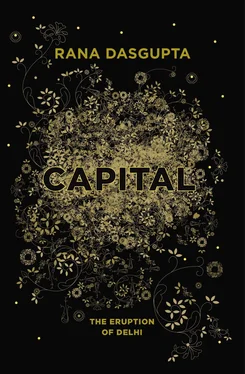It is unclear just how the brothers made all their wealth, although they do own one of the largest distributors of personal computers in South Africa. What is known is that the Guptas, together with the president’s son, Duduzane Zuma, 28, have become increasingly linked to deals that have been lucrative in the extreme.
The three are part of a consortium that will give them a stake in the global steel giant ArcelorMittal worth more than 3 billion rands [$4 million]. The brothers have been linked to plans to build a 350-billion-rand [$45 billion] high-speed railway system using state and Chinese funding.
They are also said to have become involved in the 9.7 billion rand purchase of the V&A Waterfront in Cape Town, the country’s most valuable piece of property, from a consortium that included Dubai World. The Waterfront was sold to a local group that included a state-owned pension fund. Somehow, the Guptas and Duduzane Zuma were able to come on board as black partners, a legal requirement in any deal involving a state entity. The three have denied any impropriety in their deals…
It has not helped that the Guptas’ lifestyle is so at odds with how most South Africans live. An application for a helicopter landing pad at their compound drew wide media coverage last year. Their launching of a daily newspaper, viewed as a counter to the continuing negative publicity they and their ruling party connections have received, has also not helped.
Now it appears that some in the ruling African National Congress (ANC) have had enough. Allegations that the Guptas have grown so powerful they can summon cabinet ministers to their compound and authorise the appointment of senior officials at state-owned enterprises appear to be the last straw for some. The party’s powerful youth league said this week the brothers were “colonising this country”. The country’s trade union federation, Cosatu, which is part of the ANC’s governing alliance, has also said it will launch an investigation into alleged “plundering” of the economy by the Guptas. 54
The Gupta empire, which they controlled directly and through a series of family-owned investment companies, may have begun with computers, but it quickly moved into other sectors, especially those sectors most controlled and regulated by politics: uranium and coal mining, media, aviation, etc. The business was plagued by scandal but it managed to maintain its position through a business network that included not only South African businessmen and politicians but other members of the global Indian business elite, such as the steel tycoon Lakshmi Mittal (who himself had to face allegations of improper political influence, this time within the UK government of Tony Blair; a year after the Mittal ‘cash-for-influence’ scandal, the Blair administration had to answer another set questions about the nature of its relationship to the billionaire Hinduja brothers, who appeared to have the power to fast-track their own UK citizenship applications). The dismay caused by public revelations that the Gupta family in summer 2013 made use of a high-security military base, not only to land a jet bringing guests to their family wedding, but also to absolve them of immigration requirements, showed just how much concern there was about the levels of control enjoyed by the family over systems and installations of the state.
While the Gupta family’s fortune certainly derived from its interests in Africa, its style — the pious rhetoric of vegetarianism and the extended family, the public extolling of the brothers’ saintly father and simple mother, the friendships with Indian film stars and the personal and financial investment in cricket — all came from its north Indian roots. As did the name of their original company, Sahara Holdings, named for Saharanpur in Uttar Pradesh, but which in the African context took on a different meaning. The brothers liked to joke that they turned things into a desert for their competition. 55
• • •
More than a year after my first meeting with Mickey, I meet him for another drink. He and a friend are booked for a massage at a five-star hotel; he arranges to meet me there beforehand.
He seems to have put on perfume just before getting out of the car; it overpowers me as we shake hands. He’s thirty now, and he looks more polished than I remember. His suit is beautiful. He carries nothing except an iPad and an iPhone.
His friend sits down with him and absorbs himself in some activity on a big touch screen. Mickey orders a bottle of Krug. The waiter treats him in the way I suppose he is treated in every five-star hotel of the city.
We start talking about Africa.
“The Ethiopia thing fell through,” he says. “There was a change of government and the new government wanted ten times the price. We lost $3 million on that. We had to shift the whole project to Guinea. We took more precautions this time: now we have sovereign guarantees. We managed to get our equipment out, though, which was the important thing. Our South African sugar refinery is safe.
“There are loads of Indians in Africa. Many of them are doing roses. Some rice. The Chinese don’t understand farming as well as we do, so we have an advantage. I have the sense that the Chinese are not so liked either, because they make big guarantees about the employment they will give but they end up bringing crowds of their own people.
“Over here, our real estate business is growing very fast. We’re building two big developments in Noida. One of them has a 240-metre tower, with a swimming pool and restaurant on the sixtieth floor. We’ve acquired 8,000 acres across the border in Uttar Pradesh where we’re building a complete private township. We’ve got civic authority status and we’re going to do everything ourselves. Garbage, sewers. It’s going to be a model city and we will train the population how to live in a modern city. How to divide up their garbage, not just throw it out in the streets. We have a system for collecting fees from all residents to pay for all these services.”
I already know about this new development because Mickey’s company seems to have bought up pretty much every billboard in Delhi to advertise it. Computer-generated images show a sparkling metropolis of skyscrapers and glass. The rumours are that Mickey spent significantly in excess of a billion dollars acquiring the land for his new city. Given the costs of developing that land, and all the other projects he is funding right now, one has a sense of the scale of financial backing he has.
“We’re outsourcing our architecture to the US. We couldn’t find people in India who could do the work and have now got an architect in North Carolina whose office does all the work for our projects over here.”
While he is talking, Mickey surreptitiously dials the phone number of the friend who is sitting next to him. The friend’s tablet starts to ring and he puts it to his ear. It is about the size of a hardback book. Mickey bursts out laughing.
“I just love seeing him put that thing to his ear. It’s so big he can’t even hold it in one hand.”
We talk about other things. I ask Mickey what he thinks of the calibre of other Delhi businessmen.
“Most of them are not very impressive. They’re not thinking big. You should meet a friend of mine who makes car parts. Rakesh. He’s expanding into the Middle East and Europe, he knows how to compete with China — he’s the one person I look up to. The story I hear most often is people selling out. Going to live in Europe. They can’t deal with it here — it’s too difficult — they have to pay people off at every level and get involved in politics and they just want to sell their father’s business and go to Europe. I say, ‘What are you gonna do there? What are you gonna do with the cash?’
Читать дальше











